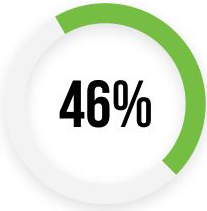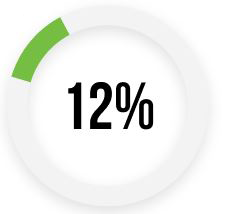How to Talk to Your Family about Inheritance
Are your Heirs in the Dark?
The biggest inter-generational wealth transfer in history is taking place right now.
A lack of communication between parents and children means that many inheritors are in the dark about their financial future and many benefactors risk not having their wishes carried out as planned.
Canadians in general can be very private about their finances, but that can cause damage within families when dividing assets. Many of us know of families that have been torn apart over the division of a business, real estate or investments, particularly when more than one child is involved.
According to an IPC Private Wealth poll of Canadians with at least $500,000 in investible assets, 58% said they have not discussed
instructions for their estate with their heirs. Of those, 46% said they intended to have a discussion at some point in the future, but 12% said they had no intention of ever discussing inheritance plans with their beneficiaries.
Most families are not having the inheritance talk
Don't avoid the Inheritance Talk
The fact that 46% of respondents said they intended to have a financial discussion with their family is a positive sign. But too often, inertia prevents these discussions from occurring before it’s too late.
An unexpected illness, which puts stress on the family, or an untimely death, can accelerate estate plans with an absence of level-headed discussion.
The 12% of people who said they never intend to talk to their heirs about their future simply represent a missed opportunity to explain the reasons behind an estate plan – minimizing taxes, supporting grandchildren or giving to charities – and foster future family harmony.

HAVE NOT HAD ANY
DISCUSSION WITH THEIR HEIRS



PLAN TO AT SOME POINT

DON'T PLAN TO AT ALL
Benefactors worry about sustainability of wealth left to heirs
Top 4 Barriers
When asked what the key barriers to heirs' ability to maintain their wealth, respondents cited:
External factors, including high cost of living
24%
Lack of financial knowledge
21%
Heirs will splurge their inheritance on 'indulgences'
18%
Heirs will lose inheritance due to divorce
14%
32%
WORRY about how their heirs will handle their inheritance
28%
DON'T trust their children's spouse to manage their inheritance
20%
WORRY heirs will have nothing left to pass on
Top 3 Fears
When asked what their main concerns were:
Share your values
Estate conversations bring peace of mind
This massive wealth transfer, at an individual level, tends to make many people nervous. Our poll revealed that one-third of those surveyed worry about their heirs’ ability to manage the money they’ll receive, and 28% don’t trust their children’s spouses to manage the money that will be bequeathed to them as a couple. However, the poll also shows that people who have discussed their plans with their children are much less likely to be worried than those who have not.
Good, up-front communication, which includes sharing family values about money, discussing intent, and explaining why a portfolio is set up the way it is, can help alleviate uncertainty, reduce angst among family members and ensure assets move more smoothly from one generation to the next.
Create an Estate Directory
When someone passes away, settling an estate can take months or years. The more wealth, in terms of investments, businesses, and properties, a person had, the more complicated the process can be. So, with research firm Strategic Insight predicting that approximately $1 trillion will be passed from one generation to the next in Canada between 2016 and 2026, it’s easy to imagine how much more smoothly the process will be with more up-front communication.
One very effective way for family members to know what makes up an estate is to fill out what we call an estate directory. This document would list all the assets and liabilities, where all important documents are kept, and the names and contact numbers of lawyers, accountants and financial advisors associated with those documents.
Efficient Wealth Transfer
A missed opportunity for a frictionless transition.
80%
Have NOT introduced
heirs to their advisor
Jump start the wealth transfer conversation
introduce your heirs
One key way to jump-start the wealth-transfer discussion is for parents to invite their children, whether they’re in their 20s or their 60s, to meet with their financial advisor.
According to our poll, only one in five respondents had introduced their children to their own financial planner or an alternate one. This is another missed opportunity, which can create a significant knowledge gap when it comes to finances related to the next generation’s own situation and money matters in general.
Anyone who has a financial advisor should make sure that person has met their children, or at least been in communication with them. Families nowadays are scattered all over the world, not necessarily living in the same city or country as their parents. But having the introduction and having children’s names on file, and contact information on hand, is very helpful and, for children, knowing who their parents’ advisor is, is a crucial matter.
Blended families bring unique challenges
Another issue that can complicate estate planning is having a blended family. According to our poll, among the 20% of Canadian blended families – those that include children from a previous union of one or both spouses – additional concerns include uncertainty over how to divide assets among children, and spouses not openly sharing their plans with one another.
For instance, if a person has children from a first marriage, which ended in divorce, and children from a second marriage, which is still intact, that has to be factored into their estate plan, even if the current spouse isn’t related to some of the children. As with the other family issues, clear communication between spouses and children is key to avoiding future problems.
The bottom line is that most people work very hard to accumulate inheritable wealth during their lifetime. If family members can understand the benefactor’s wishes with their assets after their passing, the estate settlement process will be quicker, easier and result in stronger family ties.
Manage Complex Family Dynamics
30%
WORRY how their legacy will be managed
13%
DON'T KNOW how to divide assets fairly
15%
DON'T KNOW who to appoint as primary beneficiary
Blended Families
Close to 20% of those in our survey were part of blended, non-traditional family units, with unique planning challenges and concerns.
6 Steps to a successful wealth transfer conversation.
For many Canadians, engaging in conversations about inheritance may be difficult, primarily because of anxiety over upsetting other family members. It gets tougher when blended families are involved. Not addressing plans, however, can lead to misunderstandings, unpleasant surprises, possible legal complications and, in turn, family conflict down the road.
This guide can help you start that estate-planning conversation with your family.
List of Services
-
1. INTRODUCE YOUR FAMILYItem Link List Item 1
Set up a meeting between your children, your financial advisor and yourself. Even if your adult children have their own financial advisors, it’s beneficial for them to meet yours and vice versa.
-
2. MAKE DECISIONS IN A LOW-STRESS ENVIRONMENTItem Link List Item 2
Hold a family meeting with your heirs, ideally with a financial professional, when you are healthy, and the pressure is low.
-
3. EXPLAIN YOUR OBJECTIVESItem Link List Item 3
Share your reasons for the decisions you are making, your objectives, how it aligns with your values and how you would like your legacy to be managed.
-
4 . CREATE AN ESTATE DIRECTORYItem Link List Item 4
This master directory details where your essential items are – such as bank accounts, investments, insurance policies, wills and powers of attorney – and how to access them when needed.
-
5. INCLUDE YOUR EXECUTORSItem Link
Your executors are integral to ensuring your wealth transitions successfully. Introduce your executor to your financial advisor. Your advisor can help inform and educate your executor and ensure they understand your intent and wishes.
-
6. EDUCATE YOUR HEIRSItem Link
Educate and prepare your heirs to take over and steward your wealth. Share knowledge on the value of financial planning, budgeting, tax minimization strategies or your business – if it is part of your wealth transfer. Your advisor can play a big part in helping to educate your heirs.




